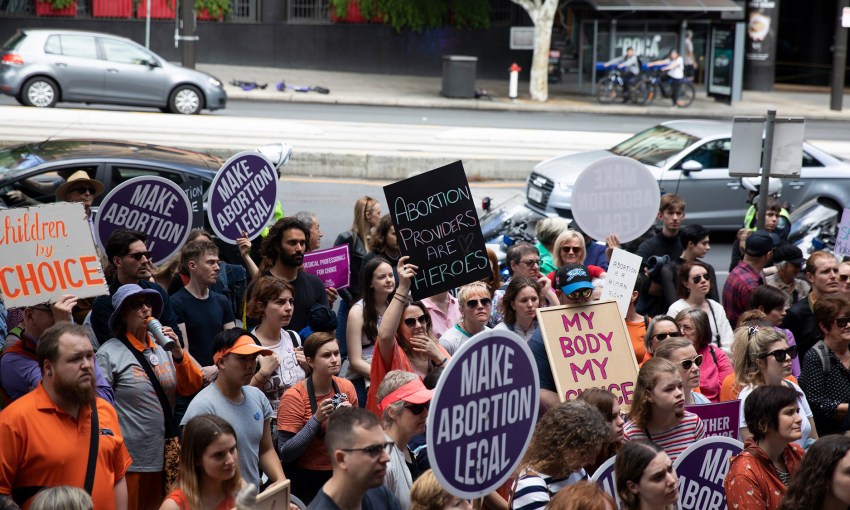A bill recently introduced to Parliament could make it a lot easier for women to access abortions, and would remove the medical procedure from South Australia's criminal code.
South Australia’s abortion laws may be changed for the first time in more than 50 years
Sandy* was experiencing a normal pregnancy, up until she received the results from a routine 18-week ultrasound. The scan identified her foetus had a duplex kidney, she tells CityMag.
A duplex kidney is when one of the kidneys has two ureters, which is a tube that allows urine to pass to the bladder. Although mostly harmless, a duplex kidney can sometimes lead to further complications that require treatment.
“I was told by my midwife that if I wanted to have an abortion, I would have to have it now,” Sandy says of the incident that occurred a decade ago.
“I wasn’t sure if the doctors were faffing around or the results got lost, but I received [the information] when I was 21 or 22 weeks pregnant.
“My midwife was aware of the time limit and it affected the way she delivered care.”
The delayed results, and South Australia’s outdated abortion laws, meant Sandy had to make an immediate decision about whether to keep the foetus or terminate.
“As soon as she [the midwife] gave me the results, it was like, ‘You have to make this decision immediately because if we wait it may not happen,’” she says.
Our state’s current laws say a South Australian resident, who’s lived here for at least two months, can acquire an early medical or surgical abortion up until 23 weeks.
Abortions that occur after 23 weeks are considered ‘late-term’, and can only lawfully be performed to save the mother’s life.
Any abortion in South Australia, no matter what stage, has to be signed off by two medical practitioners and must be held in a registered hospital.
Sandy didn’t have the abortion, but 10 years later she is very critical of a system that almost rushed her into one.
“It was a devastating time,” she says.
South Australia’s abortion legislation has not changed in over half a century, and as they currently stand, anyone found guilty of contravening abortion laws risks maximum life imprisonment.
But a new bill, championed by the Attorney-General Vickie Chapman and MP Michelle Lensink, will attempt to bring our laws “in line with all other Australian states and territories,” a statement from Vickie Chapman says.
“Our proposal removes abortion entirely from the criminal law… This is based on the understanding that it is a medical procedure which should be treated like any other health issue.”
The legislation will remove abortion from South Australia’s criminal code, and will allow a person seeking an abortion more control over the process.
South Australians will no longer be criminally liable for taking abortion pills purchased online, the rule stipulating two doctors must approve of an abortion will be scrapped, and the two-month residency requirement will be axed. The bill does still allow for health practitioners to refuse to perform or help a someone seek an abortion based on a conscientious objection.
At the end of last year, the South Australian Abortion Law Reform Institute published a 560-page report that attempted to gauge the public’s thoughts on the current rules, after it was commissioned by the AG.
SALRI collected over 3,000 submissions from religious groups, health professionals, women and other interested parties about what should change and what should stay the same. SALRI formulated 66 recommendations based on those submissions.
“SALRI’s report recommends that abortion is decriminalised by making it a regulated medical procedure under health law as opposed to a criminal law issue,” said director of SALRI, professor John Williams, in a statement last year.
SA Health accepted most of the suggestions but rejected two ideas: that there should be no gestational limits, and that after 23 weeks the procedure can be done with only one doctor’s approval.
There have been critics of the private member’s bill, such as Labor MP Clare Scriven, who told our sister publication InDaily she was sceptical of the proposal.
“Clearly the new legislation will also include mental health reasons, so will become abortion on demand up to birth,” Clare Scriven told InDaily.
After the 23 weeks limit, the procedure can go ahead if a second medical practitioner is consulted, and if they agree the procedure is “medically appropriate”, the bill says.
There has been a lot of discussion surrounding this key piece of legislation, and an adjacent bill for safe access zones around abortion centres.
Keep up to date with the issue as it evolves by subscribing to CityMag.




